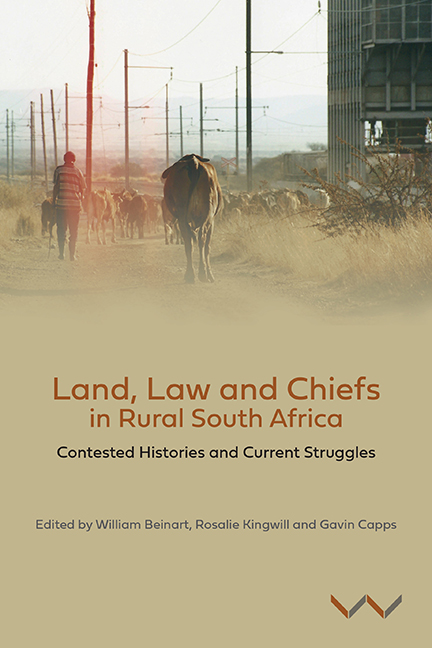Book contents
- Frontmatter
- Contents
- Maps
- Acronyms and Abbreviations
- Preface
- Introduction Land, Law and Chiefs: Contested Histories and Current Struggles
- Chapter 1 Constitutional Court Judgments, Customary Law and Democratisation in South Africa
- Chapter 2 Was ‘Living Customary Law’ There All Along?
- Chapter 3 When Custom Divides ‘Community’: Legal Battles over Platinum in North West Province
- Chapter 4 Chiefs, Mines and the State in the Platinum Belt: The Bapo-ba-Mogale Traditional Community and Lonmin
- Chapter 5 Mining, Graves and Dispossession in Mpumalanga
- Chapter 6 The Abuse of Interdicts by Traditional Leaders in South Africa
- Chapter 7 Resisting the Imposition of Ubukhosi: Contested Authority-Making in the Former Ciskei
- Chapter 8 Black Landlords, Their Tenants and the Native Administration Act of 1927
- Chapter 9 Customary Law and Landownership in the Eastern Cape
- Chapter 10 A History of Communal Property Associations in South Africa
- Chapter 11 ‘This is Business Land’: The Hlolweni Land Claim, 1983–2016
- Chapter 12 Restitution and Land Rights in the Eastern Cape: The Hlolweni, Mgungundlovu and Xolobeni Cases
- Contributors
- Index
Chapter 8 - Black Landlords, Their Tenants and the Native Administration Act of 1927
Published online by Cambridge University Press: 15 June 2021
- Frontmatter
- Contents
- Maps
- Acronyms and Abbreviations
- Preface
- Introduction Land, Law and Chiefs: Contested Histories and Current Struggles
- Chapter 1 Constitutional Court Judgments, Customary Law and Democratisation in South Africa
- Chapter 2 Was ‘Living Customary Law’ There All Along?
- Chapter 3 When Custom Divides ‘Community’: Legal Battles over Platinum in North West Province
- Chapter 4 Chiefs, Mines and the State in the Platinum Belt: The Bapo-ba-Mogale Traditional Community and Lonmin
- Chapter 5 Mining, Graves and Dispossession in Mpumalanga
- Chapter 6 The Abuse of Interdicts by Traditional Leaders in South Africa
- Chapter 7 Resisting the Imposition of Ubukhosi: Contested Authority-Making in the Former Ciskei
- Chapter 8 Black Landlords, Their Tenants and the Native Administration Act of 1927
- Chapter 9 Customary Law and Landownership in the Eastern Cape
- Chapter 10 A History of Communal Property Associations in South Africa
- Chapter 11 ‘This is Business Land’: The Hlolweni Land Claim, 1983–2016
- Chapter 12 Restitution and Land Rights in the Eastern Cape: The Hlolweni, Mgungundlovu and Xolobeni Cases
- Contributors
- Index
Summary
This chapter explores the long history of African reserves, chiefs and landholding in the Tswana-speaking areas of the northern Cape. These left a deep legacy that shapes rural society to the present. After the South African War (1899–1902), British rule gradually created two judicial and property jurisdictions in the countryside: a sphere of representative political institutions and private property for those classified as ‘white’ and one of chieftaincy and common property in the ‘black’ reserves. The untold story of territorial segregation is of a colonial government that failed fully to achieve these ends despite the coercive powers at its disposal. The reason for this failure, I argue, was that the commons were not ‘free’, but rather intricate and essentially hierarchical moral economies. We need to analyse the changing balance of power in these ‘communal tenure’ areas in order to understand the outcomes in respect of land and political authority. Mahmood Mamdani (1996: 23) argues that colonialism in the reserves produced a decentralised despotism in rural South Africa, as ‘the authority of the chief fused in a single person all moments of power: judicial, legislative, executive, and administrative.’ I identify a different process that involved, to a greater extent, the refashioning of citizenship and relations on the land from below.
The dilemma, as state bureaucrats recognised, was how to ensure that Europeans’ social reproduction sustained itself where their population would never overtake that of existing African societies. The way forward was to delineate and fix reserves for the exclusive occupation of the ‘black’ population. These had to be territories on which the colonial government had the jurisdiction to control the movement of people and allocate land. In Natal, for instance, the wars of conquest had brought existing polities to their knees, and turned them into ‘locations’, entirely the property of the Crown, governed through headmen the British appointed.
This was not the case everywhere, especially not into the hinterlands of Bechuanaland, where literacy and Christianity had strengthened chiefly institutions. Chiefs held large farms as private property along the border of the Molopo Reserves. Chiefs collected tribute and other rents from the mixed peoples who had settled on these ‘private locations’. They also held some private property in the reserves. For the most part however, the pattern of landholding in the reserves was an ambiguous negotiation.
- Type
- Chapter
- Information
- Land, Law and Chiefs in Rural South AfricaContested histories and current struggles, pp. 164 - 185Publisher: Wits University PressPrint publication year: 2021



